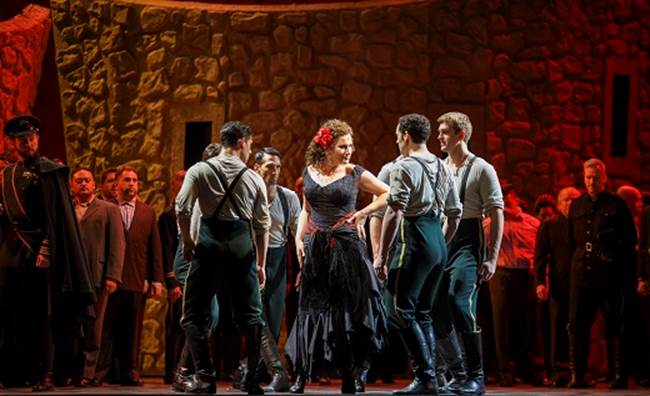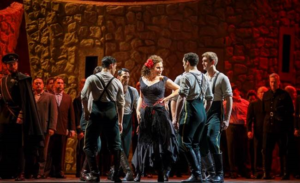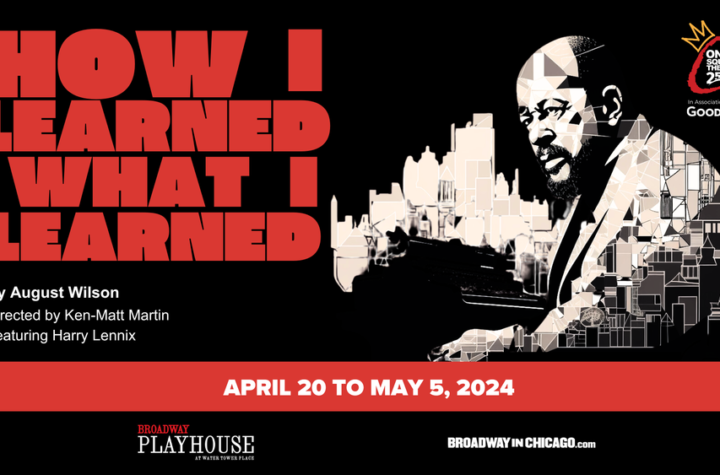
 [rating=4] Each year from February to March, the Lyric Opera performs an extended run of a highly popular opera that is likely to serve as a good entry point for new fans, and Carmen is perhaps the work best suited for that slot. Georges Bizet’s 1875 masterpiece not only contains some of the world’s most recognizable music; it is also a compelling story from a time when theatre was transitioning from paint-by-numbers melodramas into a medium for social commentators. Broadway director and choreographer Rob Ashford imbues this new-to-Chicago production with very strong ideas which he executes with varying levels of success, but which clearly communicate the gendered violence and repression fueling this tragedy.
[rating=4] Each year from February to March, the Lyric Opera performs an extended run of a highly popular opera that is likely to serve as a good entry point for new fans, and Carmen is perhaps the work best suited for that slot. Georges Bizet’s 1875 masterpiece not only contains some of the world’s most recognizable music; it is also a compelling story from a time when theatre was transitioning from paint-by-numbers melodramas into a medium for social commentators. Broadway director and choreographer Rob Ashford imbues this new-to-Chicago production with very strong ideas which he executes with varying levels of success, but which clearly communicate the gendered violence and repression fueling this tragedy.
Conductor Harry Bicket (who will be succeeded by Ainārs Rubiķis after March 6) starts off the night with Carmen’s high-energy, crowd-rousing overture, which is repeated throughout the show when large groups of characters are anticipating blood sport. The curtain then opens on a ballet depicting a bull being ritually slain by matadors in a scene that looks more inspired by Peter Shaffer’s Equus than by the updated time period of the Spanish Civil War. In contrast to the overture, the first lines of the play are from a group of soldiers guarding a cigarette factory complaining about how bored they are while languishing in the hot Seville sun. Soon, a young woman, Micaëla (Eleanora Buratto) enters, looking for her fiancé. He’s not there, and the soldiers make a move to sexually assault her before she runs off. They then return to waiting for the factory women to come out on their smoke break, and complain that the women are “insolent” for not responding to their advances.
Ashford makes the dynamic at work here obvious through the staging of Carmen’s iconic habanera, “L’amour est un oiseau rebelle.” Carmen (Ekaterina Gubanova, Anita Rashvelishvili after March 6) is surrounded by groping soldiers in the same manner as we just saw the bull being slain, and the bull-danseur himself appears on the same side of the stage as Carmen at various points in the show and mimics her emotional state. Prior to this, a group of boys (played by Chicago Children’s Choir) trotted on to mimic the actions of the soldiers they admire, including their drinking, in a manner both cute and alarming. After finishing her song, Carmen tosses a flower to Micaëla’s fiancé, Don José (Joseph Calleja, Brandon Jovanovich after March 6), ensnaring his obsession, and one brawl later, she’s seducing him, and sealing her doom.
same manner as we just saw the bull being slain, and the bull-danseur himself appears on the same side of the stage as Carmen at various points in the show and mimics her emotional state. Prior to this, a group of boys (played by Chicago Children’s Choir) trotted on to mimic the actions of the soldiers they admire, including their drinking, in a manner both cute and alarming. After finishing her song, Carmen tosses a flower to Micaëla’s fiancé, Don José (Joseph Calleja, Brandon Jovanovich after March 6), ensnaring his obsession, and one brawl later, she’s seducing him, and sealing her doom.
Gubanova is making her role debut in this production, and in addition to being a graceful and powerful-voiced mezzo, she’s also very funny. Carmen’s sense of humor is as much a part of her sexual appeal as her looks. The song she uses to seduce Don José into helping her escape, “Près des remparts de Séville,” is all about her plan to dance, get drunk, and get laid, and it sounds like it could, with a few minor changes, be a song written today. As for Don José, there’s something about him that’s brooding and desperate from the beginning, which gets very ugly indeed as he becomes unhinged by the impending death of his mother and the realization of how much he has thrown away on a whim. Carmen doesn’t seem flighty for rejecting him. In fact, her statement to some mob bosses that she won’t join their caper because Don José doesn’t want her to comes across as an excuse that she quickly realizes isn’t worth the cost of having to actually spend the evening with Don José. Calleja, who played Romeo last year, is using his volume more judiciously this time, allowing the melodies of his arias, such as his flower song, to shine through beautifully. The wisdom of his musical choices matches that of his dramatic ones.
Buratto’s rendition of “Je dis, que rien ne m’épouvante” was another musical triumph in a night full of them; is also an ironic bit of character development in which Micaëla blames Carmen for all of Don José’s choices immediately before Don José finally crosses the line and becomes utterly vile. Christian Van Horn is an eminently charismatic Escamillo, delivering everyone’s favorite toreador song with gusto. He and Calleja also demonstrate proficiency in fight director Chuck Coyl’s knife fights, as does Bradley Smoak as Zuniga. The supporting characters are played by a number of other Ryan Opera Center members who flesh out the music as nicely as they do the world of the play.
Donald Holder ‘s lighting and David Rockwell’s set strike a balance between realism and the stylization needed to incorporate the choreography, but tend more towards the latter. Along with the time shift, this presentation encourages the audience to take a more critical eye of the behaviors and attitudes onstage. Clearly, Ashford has a lot to say about this story. The biggest problem is how much he struggles to make the violence onstage seem credible. For most of the first act, the sense of danger has to be inferred from the (spoken) dialogue and Carmen’s bull-danseur shadow, because the half-hearted flailing of the chorus doesn’t provide it. Only after the violence becomes more intimate post-intermission and the main characters become increasingly isolated from the ensemble does a sense of dread really start to build. Bravo to conductor Harry Bicket for capturing the blood sport of Bizet’s music. There’s nothing like that reprise of the overture theme in the fourth act to demonstrate how excited people can get when invited to witness a murder.
Carmen runs for three hours and fifteen minutes with one intermission. Performances are as follows:
February 15 at 2:00 pm
February 19 at 2:00 pm
February 22 at 7:30 pm
March 3 at 7:30 pm
March 6 at 7:30 pm
March at 2:00 pm
March 19 at 2:00 pm
March 22 at 7:30 pm
March 25 at 7:30 pm
Performances are at the Civic Opera House, 20 N. Wacker Drive, Chicago. The Lyric offers parking deals with Poetry Garage at 201 W Madison St. if inquired about in advance. Tickets are $17-299; to order, visit LyricOpera.org or call 321-827-5600.
To see what others are saying, visit www.theatreinchicago.com, go to Review Round-Up and click at “Carmen.”







More Stories
“Joe Turner’s Come and Gone”
“How I Learned What I Learned” reviewed by Julia W. Rath
“How to Know the Wild Flowers: A Map” reviewed by Julia W. Rath